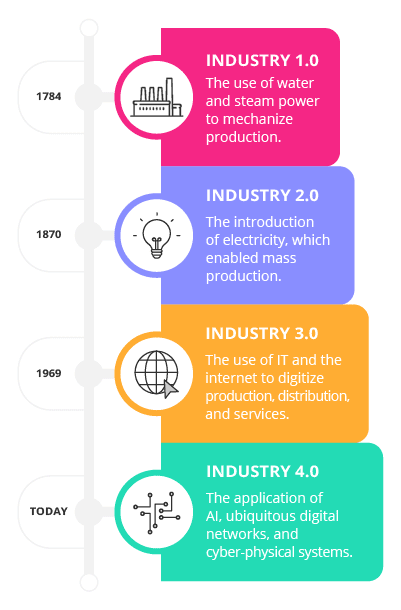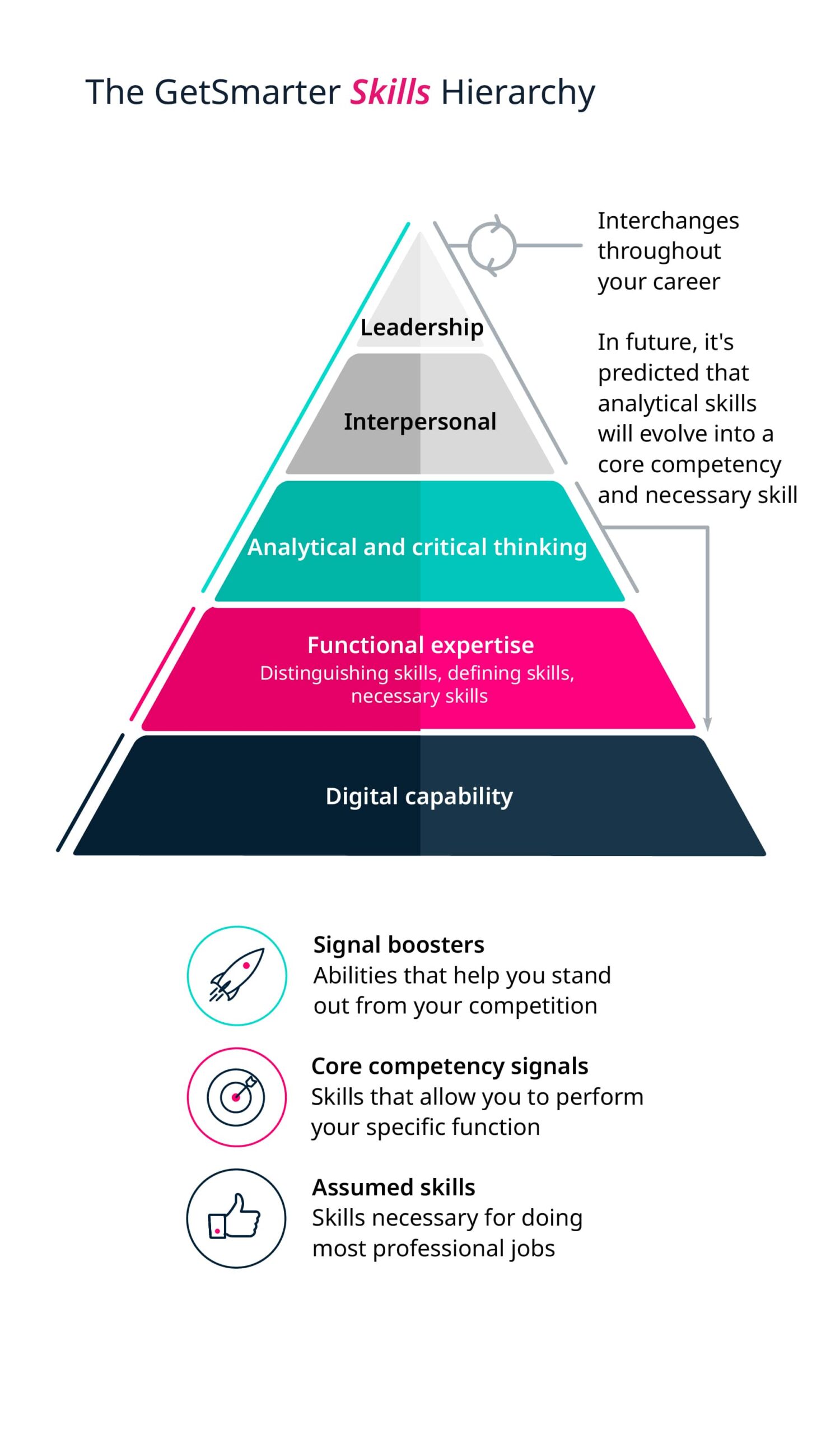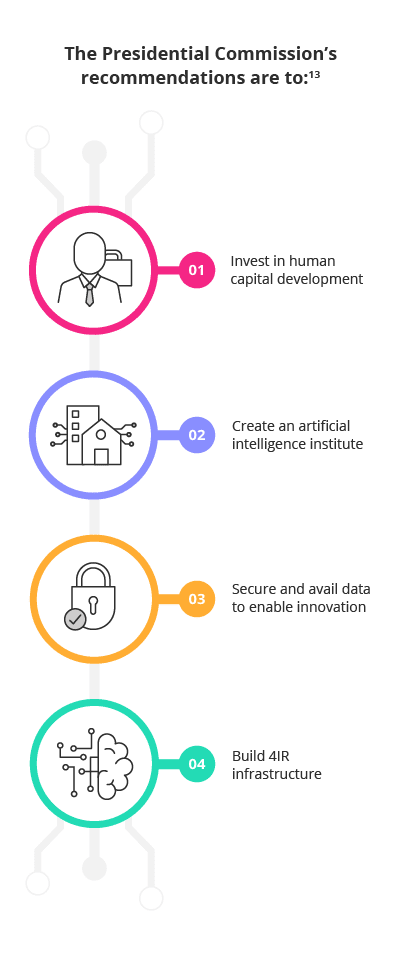The 4th Industrial Revolution: Will South Africa Be Ready for the Jobs of the Future?
The Fourth Industrial Revolution (4IR) represents a new era of innovation in technology – one that’s enhancing human-machine relationships, unlocking new market opportunities, and fueling growth across the global economy.1 In South Africa, various groups are promoting the 4IR and taking steps to leverage it. But there’s a long way to go before South Africans can enjoy the fruits of innovation-led prosperity. First, a sufficient supply of advanced engineering talent needs to be available. Beyond that, people in regular jobs need to develop the skills to deal with the disruptive effects of new technologies in their work environments. The future of South Africa’s education system is an important consideration in its journey towards the 4IR.2 Digital technologies have the potential to vastly improve education – and have become key to mitigating the learning disruption caused by COVID-19. We’re entering an era of technological empowerment, but in order to benefit from the many solutions 4IR technologies offer, we first need to address the widening professional skills gap.
What is the 4IR?
The 4IR is the current era where countries around the world are adopting game-changing technologies like artificial intelligence (AI), robotics, cloud computing, and the Internet of Things (IoT). Most importantly, the 4IR doesn’t consider any of these technologies in isolation. Instead, it encompasses a fusion in which these high-powered tech tools integrate with our physical and biological worlds. Think ubiquitous computers, interconnected digital devices, intelligent robots, autonomous vehicles, gene editing, printing of organic matter, and even brain enhancements. An effective way of understanding what the 4IR is about is to consider it in the context of the previous three industrial revolutions:3

AI is responsible for driving many 4IR technologies. In the GetSmarter Disruptive Tech Survey, which engages global business leaders and working professionals to measure demand for different technologies, AI came out on top in 2018 and 2019. Today, AI remains on the list of 2021 technology trends, alongside:4
- Internet of Behavior (IoB)
- Hyperautomation
- Privacy-enhancing computing
Though Africa hasn’t digitally transformed as quickly as other developing and developed regions, there have been significant improvements in information and communications technology (ICT). Mobile technologies and services generate millions of jobs and contribute a serious amount of economic value to the region,5 proving that digitization helps increase efficiency and growth.
Many 4IR technologies offer Africa a space on the global stage for innovation, and local business leaders are realizing the opportunities technologies enable. The question, then, is how do we address the factors causing South Africa’s progress in joining the digital revolution to lag?
Demand for tech skills in South Africa is soaring, but supply falls short
As more and more global companies seek to obtain the widely reported benefits of AI, the demand for professionals skilled in data science and advanced analytics has grown exponentially.6 In South Africa, this demand far exceeds supply, leading to a particularly severe digital skills gap. In 2020, South Africa ranked 59th out of 63 economies in the Institute for Management Development’s (IMD) World Competitiveness Yearbook – its lowest ranking since the inception of the yearbook.7 In the IMD’s digital ranking results, which measure the capacity and readiness of the same economies to adopt digital technology, South Africa ranked 60. Its overall top weaknesses were listed as digital and technological skills, as well as higher education achievement.8 To compete globally, South Africa will first need to foster an economy that empowers its citizens with the necessary future-fit skills.
Gain the skills to translate data into meaningful and actionable insights with the UCT Marketing Analytics: Strategy and Decision-Making online course.
Develop practical data science and analysis skills for use in everyday business scenarios in the UCT Data Science with Python online course.
COVID-19’s impact on digital transformation
The COVID-19 pandemic has devastated a multitude of industries, but it has also forced many organizations to rethink the way they do business by digitally adapting to the new circumstances. In South Africa, only 37 percent of companies had a digital transformation strategy at the start of the pandemic, while only 23.5 percent of businesses had a functional plan for remote working.9 Since March 2020, the majority of organizations have had to shift their workforces to home, and those who’d already started their digital transformation journey were notably better prepared for the disruption. COVID-19 required businesses to fast-track their digital strategies, resulting in major overhauls to existing data security plans, IT systems, and cloud and project management software.
Though still in the throes of the pandemic, business leaders have been confronted by the critical importance of being digitally agile. Many 4IR technologies helped companies shift and adapt for remote working, and it’s these advancements that have again shed light on the digital skills needed by professionals, and the innovation that lies just beyond.
Start upskilling today
How we respond to the future of work largely depends on how we prepare today. With the 4IR bringing about a skills shortage, upskilling – or in some cases, reskilling – will be essential to keeping up with the rate of change.
GetSmarter’s ‘The Future of Work Is Here’ report shows that digital capabilities are the most important foundational skills to have, to the point where it’s become assumed knowledge for every worker. The GetSmarter Skills Hierarchy also details how data has increased the demand for analytical and critical-thinking skills across job functions and industries.

The 2020 ‘Future of Jobs’ report from the World Economic Forum estimates that on average, organizations will require 40 percent of workers to reskill.10 Additionally, 94 percent of business leaders expect employees to pick up new skills on the job – a sharp rise from 65 percent in 2018.
In Africa alone, some 230 million jobs will require digital skills by 2030, which equates to 650 training opportunities, creating a $130 billion market.11 To respond to this demand, higher education institutions will have to reorient their ICT and engineering courses to account for rapidly advancing technologies.12 However, for the majority of African countries, there’s the added challenge of limited internet access.
The quality of African education systems and basic accessibility issues has prompted many organizations to take it upon themselves to prepare their workforce for the changes to come by facilitating a learning culture. With this support, employees are engaging with self-development tools offered by the businesses they work for. It’s this joint responsibility of learning that will ensure businesses, and professionals, are ready for the jobs of the future.
Alongside this, the South African government has also committed to a detailed proposal for catapulting the country into the 4IR.

The final report also proposes that incentives are provided for future industries, platforms, and applications of 4IR technologies, amongst other policy and council creations.
South African President Cyril Ramaphosa recognizes the 4IR’s place in driving new solutions: “As a continent that continues to be impacted by historically low levels of development, Africa can and must take advantage of technological advances to industrialize, pursue inclusive growth, and attract investment.”14 His aim is to have the nation fully harnessing the potential of technology by 2030, but in order to do so, we’ll need to respond “with agility and purpose”.
The path forward for South Africa
The exact time frame for the 4IR isn’t known, though Accenture expects that, by 2026, it could unlock around R1.4 trillion of value in South Africa across agriculture, infrastructure, manufacturing, and financial services.15
Ensuring that South Africa’s workforce will be ready for the future of work will likely require a combination of effort from various stakeholders. Mounting enthusiasm for the 4IR from different groups is a positive sign, but translating that energy into strong, cross-sectoral partnerships will be the key to effective digital skills creation.16
It’s clear that if South Africa is to become a legitimate participant in the digital revolution, it will need to make some fundamental changes first. Chief among these will be to combat the low levels of digital literacy in its workforce. Despite the daunting task ahead, South Africa has already begun to prepare to take this leap into the future with technological transformation rolling out across sectors. Beyond simple productivity improvements, 4IR technologies have also become a sign of hope in South Africa’s social and developmental challenges. It offers the opportunity for transformation, growth, and improvement, for both governments, organizations, and professionals. In more ways than one, the 4IR is a solution and tool to be harnessed, so that the future of work is one that’s inclusive and beneficial for all.
Ready to take the first step towards the future of work?
- 1 (Sep, 2019). ‘What does ‘fourth industrial revolution’ even mean?’ Retrieved from the Mail & Guardian.
- 2 Mngxati, V & de Haas, J. (2019). ‘Unlocking digital value for business and society in South Africa.’ Retrieved from Accenture.
- 3 Shivdasani, A. (Jul, 2019). ‘South Africa’s foray into the Fourth Industrial Revolution: Let’s learn to walk before we try to fly.’ Retrieved from the Daily Maverick.
- 4 Panetta, K. (Oct, 2020). ‘Gartner top strategic technology trends for 2021’. Retrieved from Gartner.
- 5 Ndung’u, N & Signé, L. (Jan, 2020). ‘The Fourth Industrial Revolution and digitization will transform Africa into a global powerhouse’. Retrieved from Brookings.
- 6 Camm, J. et al. (Jun, 2020). ‘The recession’s impact on analytics and data science’. Retrieved from MIT Sloan Management Review.
- 7 (Jun, 2020). ‘South Africa hits all time low in competitiveness ranking’. Retrieved from The South African Department of Employment & Labour.
- 8 (2020). ‘IMD world digital competitiveness’. Retrieved from IMD.
- 9 (Jun, 2019). ‘How AI is being used in South Africa.’ Retrieved from Business Tech.
- 10 (Oct, 2020). ‘The Future of Jobs Report’. Retrieved from World Economic Forum.
- 11 Caballero, A & Bashir, S. (Oct, 2020). ‘Africa needs digital skills across the economy – not just the tech sector’. Retrieved from World Economic Forum.
- 12 Caballero, A & Bashir, S. (Oct, 2020). ‘Africa needs digital skills across the economy – not just the tech sector’. Retrieved from World Economic Forum.
- 13 Dwolatzky, B & Harris, M. (Jan, 2021). ‘South Africa’s 4IR strategy: Huge gap between what’s on the ground and what the Ramaphosa commission recommends’. Retrieved from the Daily Maverick.
- 14 Dwolatzky, B & Harris, M. (Jan, 2021). ‘South Africa’s 4IR strategy: Huge gap between what’s on the ground and what the Ramaphosa commission recommends’. Retrieved from the Daily Maverick.
- 15 Mngxati, V & de Haas, J. (2019). ‘Unlocking digital value for business and society in South Africa.’ Retrieved from Accenture.
- 16 Mngxati, V & de Haas, J. (2019). ‘Unlocking digital value for business and society in South Africa.’ Retrieved from Accenture.